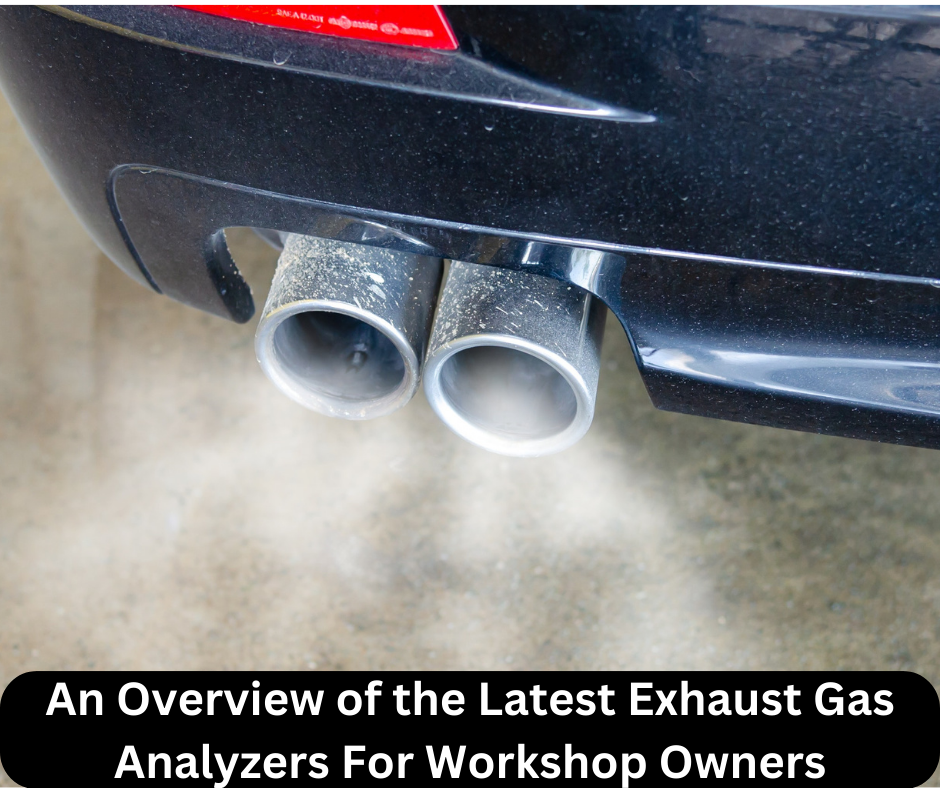Introduction:
Emissions testing plays a critical role in ensuring that vehicles meet environmental regulations and contribute to a cleaner and healthier environment. One of the key tools in emissions testing is the exhaust gas analyzer.
In this blog post, we will provide an in-depth overview of the latest exhaust gas analyzers available in the market. From their significance in emission control to technological advancements, we will explore how these analyzers help workshops and automotive professionals take control of emissions testing.
Join us as we delve into the world of exhaust gas analyzers and their impact on vehicle emissions.

Understanding Emissions Testing and Its Significance:
Emissions testing involves measuring and analyzing the pollutants emitted by vehicles, including carbon monoxide (CO), hydrocarbons (HC), nitrogen oxides (NOx), and particulate matter (PM). It is a crucial step in assessing a vehicle’s environmental impact and ensuring compliance with emission standards set by regulatory bodies.
The exhaust gas analyzer is a vital tool used in emissions testing. It measures the concentration of pollutants in a vehicle’s exhaust gases, providing valuable data for evaluation and adjustment of engine performance.
By understanding emissions levels, automotive professionals can diagnose issues, perform necessary repairs, and verify compliance with emission standards.
Technological Advancements in Exhaust Gas Analyzers:
Recent years have witnessed remarkable advancements in exhaust gas analyzer technology, enhancing accuracy, reliability, and ease of use. These new features have significantly improved the efficiency and effectiveness of emissions testing.
a. Real-time Monitoring: Modern exhaust gas analyzers offer real-time monitoring capabilities, providing instant and continuous feedback on emission levels. This allows for quick identification of potential problems and timely corrective actions.
b. Enhanced Measurement Accuracy: Advanced analyzers employ highly sensitive sensors and sophisticated algorithms, ensuring precise measurements of pollutant concentrations. This accuracy helps technicians pinpoint specific emission sources and optimize vehicle performance.
c. Expanded Analytical Capabilities: The latest exhaust gas analyzers can measure a broader range of pollutants, including greenhouse gases like carbon dioxide (CO2). This expanded analytical capability allows for a more comprehensive assessment of a vehicle’s environmental impact.
d. Integrated Data Management: Many analyzers now come equipped with data management systems that store and organize emissions test results. These systems enable easier retrieval and analysis of historical data, facilitating long-term emissions tracking and trend analysis.
The Benefits of Advanced Exhaust Gas Analyzers:
The adoption of the latest exhaust gas analyzers offers several benefits to workshops and automotive professionals:
a. Compliance with Regulations: Meeting stringent emission standards is crucial to avoid penalties and legal consequences. Advanced analyzers ensure accurate emissions measurements, aiding compliance with environmental regulations.
b. Diagnosing and Resolving Issues: Exhaust gas analyzers help identify emission-related problems, such as malfunctioning sensors or faulty catalytic converters. By diagnosing these issues accurately, technicians can carry out targeted repairs, improving vehicle performance and reducing emissions.
c. Optimizing Fuel Efficiency: Analyzing exhaust gases provides valuable insights into fuel combustion efficiency. By monitoring emissions, technicians can fine-tune engine parameters, optimize fuel-air mixture, and enhance fuel efficiency, saving costs for vehicle owners.
d. Enhancing Environmental Sustainability: By accurately measuring pollutants, exhaust gas analyzers contribute to the development of greener and more sustainable automotive practices. The data obtained from these analyzers helps in designing cleaner engines and implementing emission control strategies.
Choosing the Right Exhaust Gas Analyzer:
Selecting the appropriate exhaust gas analyzer for a workshop’s specific needs requires careful consideration. Factors to consider include accuracy, compatibility with vehicle models, ease of use, and data management capabilities. Additionally, it’s essential to consider the analyzer’s maintenance requirements, calibration intervals, and availability of technical support.
Workshop owners and technicians should also keep an eye on regulatory changes, as emission standards may evolve over time. Investing in a flexible exhaust gas analyzer that can adapt to changing regulations ensures long-term compliance and avoids the need for frequent upgrades.
Conclusion :
Exhaust gas analyzers play a crucial role in emissions testing, enabling workshops and automotive professionals to take control of vehicle emissions. With advancements in technology, the latest exhaust gas analyzers offer improved accuracy, expanded analytical capabilities, and integrated data management systems.
By investing in these cutting-edge tools, workshops can ensure compliance with environmental regulations, diagnose emission-related issues, optimize fuel efficiency, and contribute to a greener future.
As the automotive industry continues to prioritize sustainability, exhaust gas analyzers will remain vital in monitoring and reducing vehicle emissions.

Transform your automotive workshop with Moiboo Workshop Software, the perfect solution that qualifies for the Productivity Solutions Grant (PSG). This comprehensive software is tailored to meet your business’s specific needs and offers seamless integration with a wide range of features designed to boost revenue and streamline operations.
Moiboo Workshop Software automates and simplifies complex tasks, ensuring optimal efficiency throughout your workshop. From managing bookings and scheduling appointments to tracking inventory and generating invoices, this robust software saves time and reduces manual errors. By automating these processes, you can focus on revenue-generating activities that drive your business forward.
Gain firsthand experience of how this software can revolutionize your workshop operations and drive your business forward. Request your free demo today and unlock the potential of Moiboo Workshop Software for your automotive workshop. Our team of experts will guide you through the software’s functionalities, providing a clear understanding of how it optimizes your workflow and contributes to revenue growth.
What’s more, Moiboo Workshop Software has received pre-approval for the PSG Grant, streamlining the application process for your workshop. This approval ensures that the software meets the grant’s requirements, giving you confidence in your investment and allowing you to leverage its benefits effectively.
To schedule your free demo or inquire further, please reach out to us at +65 9895 1817. Our dedicated team is committed to helping you optimize workshop operations, maximize revenue, and make the most of the opportunities provided by the PSG Grant.

FAQ:
How auto exhaust gas analyzer works?
An exhaust gas analyzer is a tool that measures and analyzes the composition of exhaust gases emitted by vehicles. It provides valuable data on pollutants such as carbon monoxide, hydrocarbons, nitrogen oxides, and particulate matter, allowing for evaluation of engine performance and compliance with emission standards.
By diagnosing emission-related issues, optimizing fuel efficiency, and ensuring environmental sustainability, exhaust gas analyzers play a crucial role in monitoring and controlling vehicle emissions.
